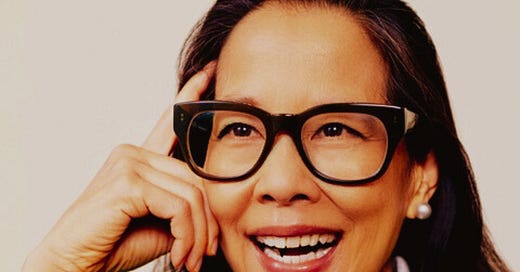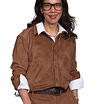✨The Empress Questionnaire: Betsy Q. Tong on Power, Pockets, and Publishing Your Way Out of the Patriarchy 👑
She’s Got the "Authority Architecture" (and the Gucci Shirtdress to Prove It)
✨ A vibrant space for midlife women, The Empress now reaches over two million readers through our networks of networks. ✨ From bestselling author Alisa Kennedy Jones. ✨ If you enjoy content about midlife, humor, and agency, I’d love to welcome you as part of our community. ✨ For only $50/year ($4.17 a month!) or $5/month, you’ll gain access to all my articles, Monday columns, book clubs, and virtual events.
Fellow Empresses, How the hell are you?
There are people you meet in midlife who remind you of your favorite shirtdress: sharp, timeless, perfectly tailored—and with pockets deep enough to carry your entire reinvention strategy. That’s Betsy Q. Tong.
She’s not just the newest member of the Empress Editions advisory board (though we’re still fanning ourselves from that coup); she’s also the woman who blew my mind wide open about how our prescriptive nonfiction titles could—and should—exist beyond the book, the audio, the workbook, and into something delightfully multimodal. Think: living, breathing, bespoke documents tailored to each reader’s transformation. Yes, please.
Betsy has a brain like a Dyson vacuum—high-powered, elegantly engineered, and terrifyingly efficient. She has frameworks for your frameworks. And somehow, amidst the strategic blueprints and AI-fueled authorship, she still finds time to text about salad kits, Law & Order reruns, and the life-altering importance of trouser skirts with pockets (SO this season).
We share a taste in clothes, in calm, and in calling time on burnout. What can I say? I love this woman. And her brain. And this wild, wonderful Empress Age she’s building, where midlife isn’t a crisis but a codebase.
So without further ado, grab a Dole kit and maybe a small Hermes, and settle in for the Empress Questionnaire with Betsy Q. Tong—where AI meets agency, and your authority becomes the main character.
👑 Let’s go.
About Betsy!
Betsy Tong is a former Fortune 50 executive who now works with high-achieving women—those who often succeeded as the only one at the table and are done proving themselves inside systems that no longer serve them. After decades of building global data center operations, launching $500M businesses from 10-page PowerPoint decks, and leading international M&A, she left corporate to architect a new kind of success as a solopreneur and creator.
She helps senior women translate decades of judgment, influence, and delivery into systems they fully own—building businesses without burning out. Her frameworks, including Authority Architecture and SMARTER Goals for Operators, are used by advisors, solopreneurs, and founders to shift from rate-times-hours work to codified, scalable IP.
Her work is rooted in lived experience—caregiving through her mother’s terminal cancer, managing her father’s early-stage dementia, and navigating reinvention after a layoff. She believes that experience and reputation without packaging is a waste of earned genius. Betsy has written five best-selling books by building a repeatable system that uses AI not as a gimmick, but as a force multiplier for human insight. She doesn’t preach reinvention—she builds it, step by step, with women ready to bet on themselves.
About The Authority Architecture
The Authority Architecture is a system for women who built their reputations inside corporate walls—and now need to build businesses that reflect how they actually operate and the constraint of the unpaid second shift.
Founded by Betsy Tong, a former Fortune 50 executive, this method was born from a brutal realization: experience doesn’t convert once the title disappears. You could lead global ops, launch $500M ventures, carry teams through crises—and still be disposed of. Very quickly, you learn what made you great becomes irrelevant if you cannot translate that to how you solve a problem for someone who can hire you. What got you here—track record, reputation, proximity—doesn’t get you there.
The Authority Architecture addresses that gap directly. It doesn’t ask women to become influencers or coaches. It teaches them how to structure their authority into something buyable, scalable, and aligned with the life they want or must lead.
The work follows four components:
Specificity – Say exactly who you serve and what result you drive.
Method – Codify how you do it into a repeatable system.
Proof – Pull forward the receipts, not the résumé.
Packaging – Turn it into an offer that forces a yes or no.
It’s not about posting more or pitching harder. It’s about engineering precision. Betsy’s clients codify what they already do and think into methods, build offers that force a decision, and install systems designed for the right clients to say yes. Every piece is built to stop circling in conversations and start closing—without burnout, dilution, or ambiguity.
At its core, this work is about exiting the “I can do everything” employee trap and stepping into CEO-level clarity. It turns decades of complex delivery into leverage. That’s why it works. It doesn’t ask women to start over. It gives them the infrastructure to own what’s already true—and make it obvious.
1. What is your idea of perfect midlife happiness?
I crave peace because, for decades, I was the vessel for others, the caretaker and rescuer, the highly capable commander. My identity was wrapped up in being a hyper caretaker because it was the way I hoped others would love me.
Mel Robbins' anthem “Let Them” is a visceral rejection of control. For me, the power comes from “let go.” When you have trained yourself to be a high performer, always in motion and making climbing mountains doable, learning to put your mask on first is hard.
Letting go, and frankly losing the last of caring what others think of me, is allowing me to build a new type of business engine that works for me.
2. Which empress, queen, goddess, or mythical figure do you most identify with?
From primary school, I wanted to be Queen Elizabeth the First. She understood early she could not follow a traditional path - marriage and heirs - if she wanted to preserve authority, so she did it and for a larger purpose, England. She didn’t reject the traditional out of singularity, she had the intelligence and insight to weigh the cost of living on someone else’s terms.
Elizabeth withstood the challenge by knowing who she was and what she stood for.
3. Which living midlife woman do you most admire? (And why?)
Caroline Criado Perez’s Invisible Women revealed that our world—across infrastructure, healthcare, economics, public policy, and technology—is built on data that defaults to the male body, male behavior, and male experience. This is not necessarily intentional misogyny. It’s systemic omission. Because women’s experiences, needs, and realities have been historically under-measured, under-researched, or treated as deviations from the norm, the systems designed to serve “everyone” consistently fail women in measurable, often dangerous ways.
She doesn’t argue that women are excluded from power (though they are); she argues that even in seemingly neutral systems, the inputs don’t account for half the population.
The Patterns Perez’ Writing Uses to Reveal It:
1. Forensic Layering
She opens each chapter with what feels like a small, plausible oversight—a snowy sidewalk not shoveled for pedestrians, a mobile phone too large for one-handed use. But then she stacks data, incident reports, studies, and economic outcomes to show evidence accumulation.
2. Discipline Before Outrage
She never starts from anger. She starts from calm, sourced detail—and lets the reader arrive at anger on their own. That restraint gives her power.
3. Cross-Domain Repetition
She proves the same pattern in domains that are siloed—medicine, urban planning, disaster relief, and workplace policy. That recurrence is what makes the argument undeniable.
4. Weaponized Banality
Perez is most devastating when the exclusion is framed as routine. The most powerful moments in the book aren’t the dramatic cases like the fact that women spend ⅓ more time waiting in bathroom lines even though our toilets have the same square footage. She exposes the absurdity by walking you through the math.
5. Hidden Cost Accounting
Her most consistent move is economic. She quantifies loss of time, money, opportunity, and sometimes life. That repositioning forces male-dominated institutions to see the bias not as a moral failure, but as inefficiency and risk exposure. It flips the burden of proof.
Perez proves that the systems most people trust as objective—science, policy, infrastructure—are built on flawed inputs. Once you see the missing pieces, the world doesn’t look neutral anymore.
4. What aspect of midlife or the menopausal journey do you most deplore?
This is an age when we should be coasting from career mastery to legacy - the average CEO is 58. Constraints of our bodies and the unpaid second shift force women to take a step back when all they sacrificed earlier should end in smashing the ceiling.
77% of women report a significant impact on their mental state. 23% consider quitting, 10% do.
25% of us have the burden of the second shift too, caring for elderly parents or loved ones which takes away focus and presence.
This isn’t about individual decline. It’s about real capacity that is lost to a traditional work system, and the degradation of our earnings.
5. What do you most treasure or value about this phase of life?
I have achieved wealth that gives me peace. I lost everything that should have mattered to me in 2023, my job, and partner, and moved states to take care of my father with dementia. What I treasure most is how I reinvented myself, used the rise of AI to build five books, defined a new business, and am building a community that shows up for me on LinkedIn.
6. If you could share one key midlife lesson, hack, or nugget of wisdom, what would it be?
This period where we are adapting to AI has never been more ripe for women to be solopreneurs and the CEO of their own lives. You don’t have to make a binary decision between staying on someone else’s hamster wheel and using the availability of tools, technologies, and knowledge to apply your expertise to a real business that fits into the way you live.
7. What gives you the greatest sense of agency in midlife? (i.e., “Knowing that I can…”)
When I was laid off, my phone and calendar alerts were so quiet. I felt irrelevant and small. The only one asking for me was my father and only because he needed tech support. I thought about decades ahead of me of a life getting more and more silent.
What changed for me was the public launch of AI and the access to all the knowledge in the world to explore and learn. To learn AI, I wrote my first book in 72 hours and created my system for producing books, doing it six more times in six months for myself and others. Now I consult others who see books as a way to work through their methodology and what makes them an authority.
8. Give us the headline for your Empress Age. (one that captures the bold narrative you are rewriting for the latter half of your life)
“No longer proving, publishing.”
Betsy’s Empress Edit
Skirts and dresses with pockets.
BTS (See below for pure dopamine!)
Procedural BBC murder mysteries
Law & Order franchise (except SVU, that is too much for me to consume)
Where readers can find you:
betsyqtong.ai - my clone, you can talk to me (her)
LinkedIn - https://www.linkedin.com/in/betsytong/
The Authority Architecture: Own the Market with the Authority Architecture®
For high-performing women who are done being the best-kept secret, this book lays out the exact system to turn decades of credibility into clear, structured authority. It’s not about being visible—it’s about being buyable, on your terms. (Link)
The Edge: Your Brain on AI
For ambitious professionals who don’t want to be replaced—or left behind. This book shows you how to think with AI, not about it, and how to use it to produce, position, and protect your value. (Link)
Unstoppable Advantage
A blueprint for executives navigating constant disruption. It’s not about resilience as a buzzword—it’s about building systems that let you lead through volatility without losing your edge. (Link)
On the Frontlines
A raw, unfiltered guide for unpaid caregivers navigating early-stage dementia. It’s not a memoir—it’s a survival manual for those balancing love, rage, and logistics, often alone. (Link)
ADAPT: A Framework for the C-Suite to Thrive in the Shadow of AI
For executives who know disruption isn’t coming—it’s already here. This is the playbook for those who want to lead through AI with clarity, not fear, and make decisions that preserve both relevance and power. (Link)
We hope you enjoyed this week’s questionnaire.
Yours in Grandeur & Deep Sh*t,
PS - I am a human typo. Amnesty appreciated.
*The information contained in this post is intended for informational purposes only and is not intended to diagnose, treat, cure, or prevent any illness. Before using any practices or products referenced in this piece or others, always consult your healthcare providers, read all labels, and heed all cautions that come with the products. Information received from this piece, or anywhere in this Substack, should never be used in place of a consultation or advice from a healthcare provider. If you suspect you have any adverse conditions, please consult your healthcare providers immediately. This Substack, including Alisa Jones and any other writers or editors, disclaims any responsibility for any possible adverse effects from the use of any information contained herein. Opinions of any writers in this Substack are their own, and the Substack does not accept responsibility for statements made by writers. This Substack does not make any representations or warranties about a writer’s qualifications or credibility.
Here are some lovely things readers have said recently about this newsletter:
“One of Substack’s funniest voices on midlife, menopause, and showing up for yourself.”
“It's so refreshing to read inspiring, longer-form deep dives after years of swimming in seas of short-form social media.”
“Alisa always brings something extraordinary as a writer and it's forever enlightening to peek into her midlife brain.”
I’d love to see you as part of the community — and I hope you enjoy these pieces above about midlife love, agency, and believing in yourself.















Welcome, Betsy! Although right now i kinda feel like I'm living in Betsy's world ;)
A true Empress...huzzah!
An AI bot? Who knew that was a thing already? Excited to dive deeper into understand how executive women can their Authority Architecture. And that Gucci dress is everything. Yes, please!